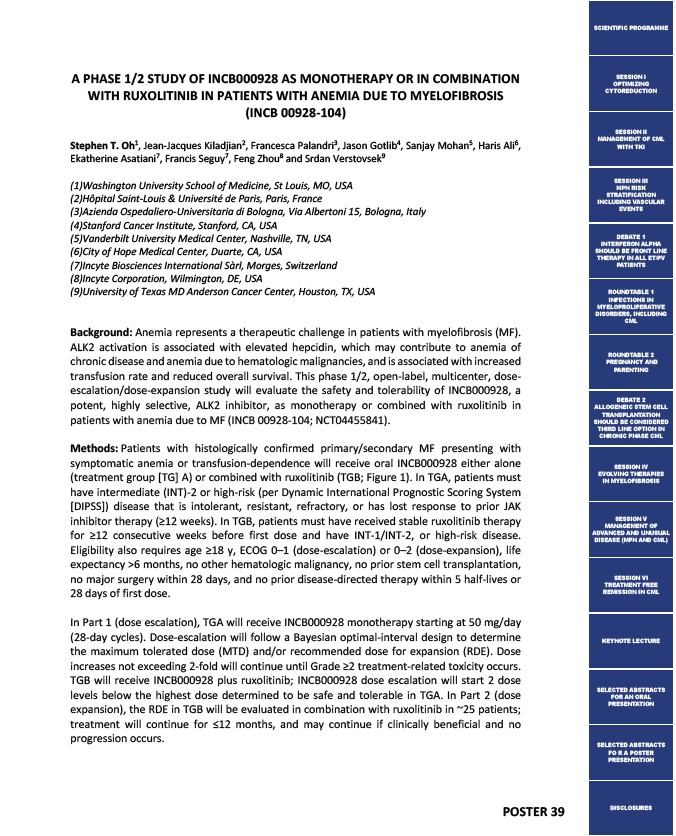
A PHASE 1/2 STUDY OF INCB000928 AS MONOTHERAPY OR IN COMBINATION
WITH RUXOLITINIB IN PATIENTS WITH ANEMIA DUE TO MYELOFIBROSIS
POSTER 39
(INCB 00928-104)
Stephen T. Oh1, Jean-Jacques Kiladjian2, Francesca Palandri3, Jason Gotlib4, Sanjay Mohan5, Haris Ali6,
Ekatherine Asatiani7, Francis Seguy7, Feng Zhou8 and Srdan Verstovsek9
(1)Washington University School of Medicine, St Louis, MO, USA
(2)Hôpital Saint-Louis & Université de Paris, Paris, France
(3)Azienda Ospedaliero-Universitaria di Bologna, Via Albertoni 15, Bologna, Italy
(4)Stanford Cancer Institute, Stanford, CA, USA
(5)Vanderbilt University Medical Center, Nashville, TN, USA
(6)City of Hope Medical Center, Duarte, CA, USA
(7)Incyte Biosciences International Sàrl, Morges, Switzerland
(8)Incyte Corporation, Wilmington, DE, USA
(9)University of Texas MD Anderson Cancer Center, Houston, TX, USA
Background: Anemia represents a therapeutic challenge in patients with myelofibrosis (MF).
ALK2 activation is associated with elevated hepcidin, which may contribute to anemia of
chronic disease and anemia due to hematologic malignancies, and is associated with increased
transfusion rate and reduced overall survival. This phase 1/2, open-label, multicenter, dose-escalation/
dose-expansion study will evaluate the safety and tolerability of INCB000928, a
potent, highly selective, ALK2 inhibitor, as monotherapy or combined with ruxolitinib in
patients with anemia due to MF (INCB 00928-104; NCT04455841).
Methods: Patients with histologically confirmed primary/secondary MF presenting with
symptomatic anemia or transfusion-dependence will receive oral INCB000928 either alone
(treatment group TG A) or combined with ruxolitinib (TGB; Figure 1). In TGA, patients must
have intermediate (INT)-2 or high-risk (per Dynamic International Prognostic Scoring System
DIPSS) disease that is intolerant, resistant, refractory, or has lost response to prior JAK
inhibitor therapy (≥12 weeks). In TGB, patients must have received stable ruxolitinib therapy
for ≥12 consecutive weeks before first dose and have INT-1/INT-2, or high-risk disease.
Eligibility also requires age ≥18 y, ECOG 0–1 (dose-escalation) or 0–2 (dose-expansion), life
expectancy >6 months, no other hematologic malignancy, no prior stem cell transplantation,
no major surgery within 28 days, and no prior disease-directed therapy within 5 half-lives or
28 days of first dose.
In Part 1 (dose escalation), TGA will receive INCB000928 monotherapy starting at 50 mg/day
(28-day cycles). Dose-escalation will follow a Bayesian optimal-interval design to determine
the maximum tolerated dose (MTD) and/or recommended dose for expansion (RDE). Dose
increases not exceeding 2-fold will continue until Grade ≥2 treatment-related toxicity occurs.
TGB will receive INCB000928 plus ruxolitinib; INCB000928 dose escalation will start 2 dose
levels below the highest dose determined to be safe and tolerable in TGA. In Part 2 (dose
expansion), the RDE in TGB will be evaluated in combination with ruxolitinib in ~25 patients;
treatment will continue for ≤12 months, and may continue if clinically beneficial and no
progression occurs.
SCIENTIFIC PROGRAMME
SESSION I
OPTIMIZING
CYTOREDUCTION
SESSION II
MANAGEMENT OF CML
WITH TKI
SESSION III
MPN RISK
STRATIFICATION
INCLUDING VASCULAR
EVENTS
DEBATE 1
INTERFERON ALPHA
SHOULD BE FRONT LINE
THERAPY IN ALL ET/PV
PATIENTS
ROUNDTABLE 1
INFECTIONS IN
MYELOPROLIFERATIVE
DISORDERS, INCLUDING
CML
ROUNDTABLE 2
PREGNANCY AND
PARENTING
DEBATE 2
ALLOGENEIC STEM CELL
TRANSPLANTATION
SHOULD BE CONSIDERED
THIRD LINE OPTION IN
CHRONIC PHASE CML
SESSION IV
EVOLVING THERAPIES
IN MYELOFIBROSIS
SESSION V
MANAGEMENT OF
ADVANCED AND UNUSUAL
DISEASE (MPN AND CML)
SESSION VI
TREATMENT FREE
REMISSION IN CML
KEYNOTE LECTURE
SELECTED ABSTRACTS
FOR AN ORAL
PRESENTATION
SELECTED ABSTRACTS
FO R A POSTER
PRESENTATION
DISCLOSURES